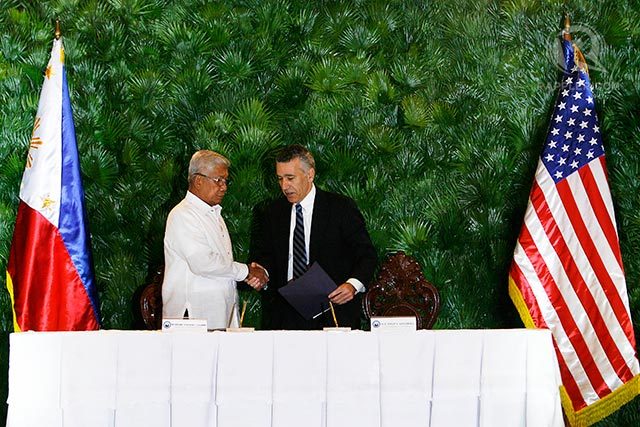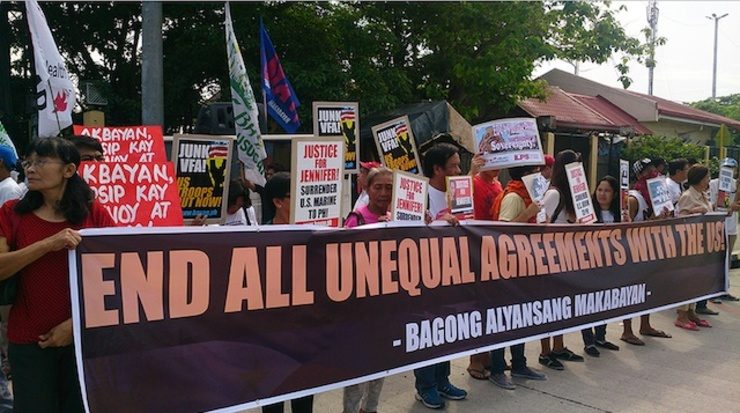SUMMARY
This is AI generated summarization, which may have errors. For context, always refer to the full article.

MANILA, Philippines – They called it “bases access” when the Philippines and the US negotiating panels first sat down in August 2013 to discuss a new military-to-military agreement that expands US military presence in the Philippines. Based on the buzz words they used, it was clear what they had in mind – “increased rotational presence,” “prepositioning of equipment,” and “development of Philippine facilities.”
Foreign Affairs Secretary Albert Del Rosario was also categorical in his opening speech that the agreement now called Enhanced Defense Cooperation Agreement (EDCA) is meant to boost maritime security in the wake of China’s aggressiveness in the West Philippine Sea (South China Sea).
‘Maritime security and maritime domain awareness will be given a boost even before we have ships and aircraft we need. And even before we have the advanced and sophisticated hardware we wish for, we will know how to operate and maintain them.’
– Foreign Affairs Secretary Albert Del Rosario in a speech he read before reporters in August 2013
From the get-go, Senator Juan Ponce Enrile and later Senator Miriam Santiago argued that the deal cannot be a mere executive agreement as planned, but a treaty that requires the ratification of the Senate. The issue dogged Malacañang and the negotiators, who repeatedly maintained that EDCA is a mere implementation of existing treaties – the Mutual Defense Treaty (MDT) and the Visiting Forces Agreement (VFA). (READ: Miriam: SC will junk PH-US military deal)
Others raised arguments against increased US military presence: the US refusal to return the Balangiga Bells; the old case of Lance Corporal Daniel Smith which shows how VFA, according to critics, was poorly negotiated to give the US custody over erring US servicemen; and the environmental damage to Tubbataha Reef when a US ship ran aground the protected area.
These issues however were largely drowned in the 8 months that took them to negotiate the agreement because of a series of events: China disinvited President Benigno Aquino III to the China-ASEA Expo in September, it heightened regional tension when it set up an air defense zone that prompted Japan to scramble its fighter jets, it violently drove away Filipino fishermen from Panatag Shoal (Scarborough) using water cannons, and in the most provocative way harassed a Philippine ship on its way to rotate and resupply troops in Ayungin Shoal.
- Document: EDCA
- Obama: US commitment to PH ‘ironclad’
- How far will the US go to defend the Philippines?
- SolGen: EDCA needed to defend West PH Sea
- ‘EDCA allows US military to build anywhere in PH’
- Senators pinpoint 7 flaws in EDCA
- EDCA benefits PH more than US
- PH wants US to use bases facing West PH Sea
It was in this context that EDCA was signed on April 28, two hours before US President Barack Obama arrived in the Philippines. A day later, the US President declared his “ironclad commitment” to defend the Philippines before an audience of Filipino and American troops.
Former UP law dean leads anti-EDCA lawyers
Petitions were filed before the Supreme Court a month later to raise the issues that China’s threat put in the backburner. Their demand: Nullify EDCA and declare it unconstitutional. At the forefront is the issue of whether or not EDCA needs Senate ratification.
Both petitions also raised the supposed lopsidedness of the agreement in favor of the Americans.
On Tuesday, November 18, oral arguments begin in the Supreme Court. Leading the petitioners is no less than former University of the Philippines College of Law Dean Pacifico Agabin. He will be joined by lawyers Evalyn Ursua and Harry Roque. Ursua fought the US in the decade-old rape case against US Marine Daniel Smith, while Roque is fighting the US in the new murder case against US Marine Joseph Scott Pemberton.
But the government made sure that the West Philippine Sea will not be forgotten during the oral arguments. In its reply to the petitions, the Office of the Solicitor General reminded the High Court of the need to consider that “recent events in Philippine territory undoubtedly compromise the security of the Philippines.”
During the oral arguments on Tuesday, November 18, the questions the justices will raise to the petitioners and the government lawyers could give a glimpse of the direction they will take in deciding the issue. Will the High Court approach the case from a purely legal standpoint? Or will they consider the security situation in the West Philippine Sea?
Former senators file first petition
There used to be US bases in the Philippines that hosted tens of thousands of US troops. In 1991, the Senate’s “Magnificent 12” voted to evict them. The US troops were able to return on rotational basis through the Visiting Forces Agreement (VFA), which was ratified by a different batch of senators in 1999.
EDCA, by allowing US troops to construct facilities and preposition assets, is “de facto” military basing, argued the first petition led by two of the “Magnificent 12” – former senators Rene Saguisag and Wigberto Tañada.
Basing, the petition argued, may only be allowed through a treaty. The negotiators argued that EDCA is not basing because the US troops will only be allowed to use lots inside existing Philippine military bases, an arrangement that is actually already in place in some parts of Mindanao. (READ: What is EDCA? Look at Zambo’s PH-US joint operations)
“At the very least, the Philippine government must comply with the constitutional requirements when entering into international treaties and agreements such as EDCA,” the petition added.
The petitioners also likened the Philippine-US relationship to an “unequal and exploitative love affair.” The Philippines, it added, should “negotiate for the best possible terms for just, fair, and equitable agreement.”
‘Without fail, the Philippines takes on the role of the dedicated lover, whose undying devotion is reciprocated with abuse and exploitation by its partner.’
– Petition led by former senators Rene Saguisag and Wigberto Tañada
The senators’ petition said Defense Secretary Voltaire Gazmin cited grave abuse of discretion when he signed the deal for the following reasons:
- The Mutual Defense Treaty has been superceded by the 1987 Constitution, which expressly rejects war
- It violates the prohibition on nuclear weapons
- EDCA is contrary to national interest and highly disadvantageous
- EDCA makes the Philippines a target of enemies
- EDCA is a treaty and not an executive agreement
The petition also dismisses arguments in favor of improving the country’s defense posture against China’s aggressiveness. It questions US commitment to defend the Philippines against China if the maritime conflict comes down to an armed struggle.
“Although it was signed in the context of heightened tension with China and dangled as proof of America’s “ironclad” commitment to defend the Philippines against Chinese expansionism, there is no assurance that the US will actually come to the aid of the Philippines in case of an invasion by China,” the petition added.
The other petitioners are former University of the Philippines President Francisco “Dodong” Nemenzo, Dean Pacifico Agabin, Esteban “Steve” Salonga, Harry Roque, Evalyn Ursua, Edre Olalia, Carol Araullo, and Roland Simbulan.
Leftists file second petition
The second petition was filed by the leftists. They said the Philippine-US relationship has been lopsided since the Battle of Manila Bay in 1898, which paved the way for transfer of the Philippines from Spanish to American rule.
They said that the agreement deprives the country of its “power to tax, an incident of sovereignty,” as “agreed locations are made available to the US rent-free.”
The text and subtext of the arguments in this petition are openly directed at this subservience of the Philippine government to the blatant and outright prevarications and lies that US interests have peddled for more than a century now.
– Second petition filed by Bayan, Bayan Muna, Gabriela, ACT Teachers, Anakpawis, Kabataan, and Makabayan

The petitioners argued that EDCA constitutes grave abuse of discretion because of the following:
- EDCA constitutes a derogation of national sovereignty and territorial integrity
- EDCA is basically a basing agreement in violation of the constitution and contrary to the tenets of international law
- EDCA is not an implementation and furtherance of the Mutual Defense Treaty and the VFA
- EDCA is contrary to various provisions of the constitution and other laws
“We will set out to prove that the EDCA is a new basing agreement whose provisions violate the Philippine constitution. We will argue that the EDCA’s provisions go beyond existing agreements such as the Mutual Defense Treaty and the Visiting Forces Agreement. We will also point out that President Benigno Aquino III, in entering into the EDCA, violated the constitution,” said Renato Reyes Jr of Bayan, one of the petitioners.
Yolanda and Pemberton
On top of the China threat, two other events happened that shaped public discourse on increased US military presence in the Philippines.
First, Super Typhoon Yolanda (Haiyan) in November 2013 flattened many parts of Central Philippines and US troops were among the first responders. And second, the death in October 2014 of a Filipino transgender woman allegedly in the hands of US Marine Private First Class Joseph Scott Pemberton.
The US military swooped in with overwhelming number of aircraft and ships based in nearby US bases. The US troops helped fly in relief assistance and fly out typhoon victims who sought assistance from relatives in Metro Manila or Cebu. The panelists would later argue that US assistance would have been so much faster if the assets were prepositioned in the country. (READ: VFA allowed US troops to rush to aid of Yolanda victims – US)
But then Jennifer Laude was killed in October and the entire country was reminded of the decade-old case of Lance Corporal Daniel Smith, who was detained inside the US embassy throughout the 4-year judicial proceeding. It was characterized by an ugly custody battle, a low point in PH-US relations that highlighted what critics said was a poorly negotiated VFA. (READ: EDCA, Olongapo murder, and the old case of Daniel Smith)
A decade later, the US offered a compromise in the custody issue. Pemberton was transferred to a detention facility inside Camp Aguinaldo but keeps custody over the US Marine. It is a step forward, but critics said it is not enough.
AFP: EDCA implementation is urgent
Armed Forces chief General Gregorio Catapang Jr has said that the implementation of EDCA is urgent. Delays in EDCA, he said, mean delaying the assistance that the US is offering the Philippines not only for territorial defense but also for humanitarian assistance and disaster response (HADR).
“This is very significant,” added General Alexander Lopez, the chief of the military’s Western Command (Wescom) responsible for the entire West Philippine Sea including Scarborough Shoal off the coast of Luzon. EDCA, he said, is not just for the Wescom but for the entire armed forces.
“You worry about having US stations, hindi mangyayari ‘yun. Hindi mangyayari ‘yun (That won’t happen),” he said in an interview on the eve of the SC oral arguments.
The list of issues surrounding US troops in the Philippines is as long as their presence. But will the singular fear of China invading the West Philippine Sea overcome them all? The fate of EDCA is now in the hands of 15 justices of the Supreme Court. – Rappler.com
Add a comment
How does this make you feel?
There are no comments yet. Add your comment to start the conversation.